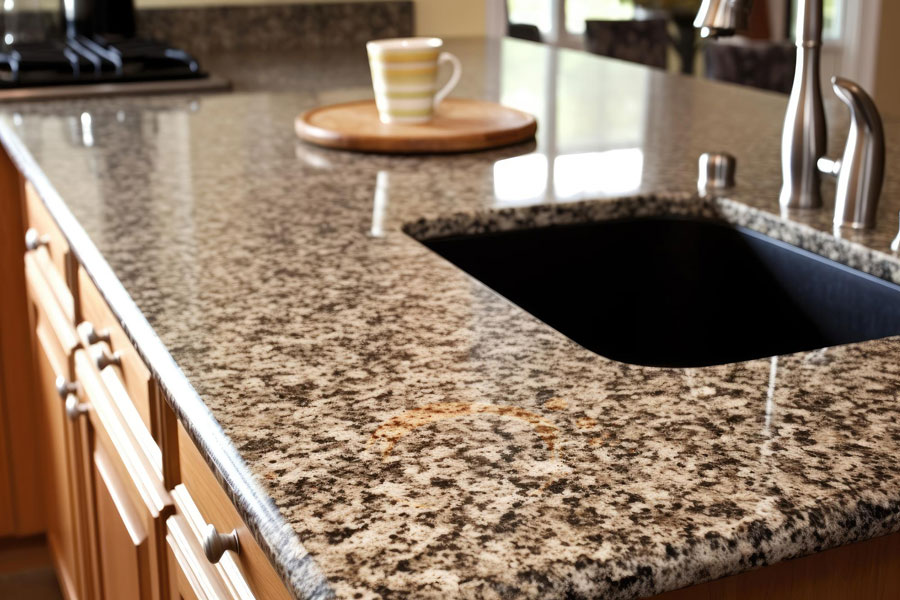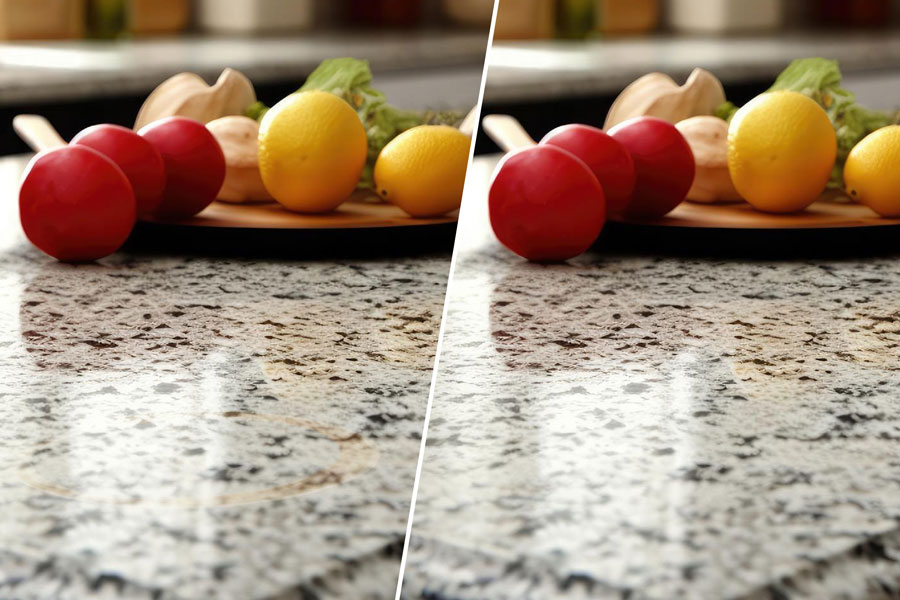Do you find yourself constantly wiping down your granite countertops and getting disappointed by the stubborn buildup of hard water stains?
If so, you’re not alone. We understand how grueling it can be to invest time and resources into maintaining your kitchen or bathroom countertops, only to be left with unsightly water spots.
Hard water stains are caused by the presence of minerals in the water reacting with the surface of the granite. If left untreated, they can dull the natural beauty of the stone. Further, no one wants to lose the beauty of the precious granite stone. Read on to discover how you can effectively remove hard water stains from granite, restoring its original shine and beauty.
The Root Cause of Hard Water Stains on Granite
You love your granite surfaces. They add elegance and value to your home.
But there’s one problem: hard water stains.
These are the white, cloudy, or chalky marks that appear on your granite countertops, floors, or features over time.
They make your granite look dull and dirty. And they’re hard to get rid of.
So what causes hard water stains on granite?
And how can you prevent them from ruining your beautiful surfaces? That’s what you’ll learn in this section.
Hard water is water that has high levels of minerals, such as calcium and magnesium. These minerals come from the rocks and soil that the water passes through. When hard water comes into contact with your granite surfaces, it leaves behind some of these minerals as it evaporates.
This creates a thin layer of mineral deposits on your granite, which is what you see as hard water stains.
Hard water stains can affect the appearance and durability of your granite surfaces. They can make your granite lose its shine and color.
They can also damage the sealant that protects your granite from stains and scratches.
That’s why it’s important to prevent and remove hard water stains from your granite surfaces as soon as possible.

Essential Tools and Materials
Before you embark on your hard water stain removal journey, it’s important to gather all the necessary tools and materials. Here’s what you’ll need:
- Mild detergent
- Soft microfiber cloths
- Non-abrasive scrubbing pad
- Rubber gloves
- Baking soda (for homemade remedies)
With these items at your disposal, you’re well-equipped to tackle those stubborn stains.
Step-by-Step Cleaning Process
Removing hard water stains from granite requires patience and gentle techniques. Here’s a step-by-step process:
- Wet the stained area with warm water.
- Apply a small amount of mild detergent to a soft cloth.
- Gently scrub the stained area.
- Rinse thoroughly with warm water.
- Dry the area with a soft cloth.
Remember, harsh scrubbing can damage the granite surface. It’s important to be patient and persistent.
Homemade Remedies for Hard Water Stains
If you’re a fan of DIY solutions, you’ll be pleased to know that there are several homemade remedies that can effectively remove hard water stains from your granite surfaces.
One popular option is a paste made from baking soda and water. Here’s how to use it:
- Mix equal parts of baking soda and water to form a paste.
- Apply the paste to the stain.
- Let it sit for 15 minutes. This allows the paste to break down the mineral deposits.
- Gently scrub the area with a soft cloth.
- Rinse thoroughly with warm water.
Vinegar and lemon juice are also effective due to their acidic nature. They can break down the mineral deposits left by hard water. However, they should be used sparingly and always diluted with water to avoid damaging the granite.
Commercial Cleaners and Sealants for Granite Surfaces
For tougher stains, you might consider using a commercial cleaner designed specifically for granite surfaces. These products are formulated to remove stains without damaging the granite. They often contain mild abrasives that can scrub away the hard water stains without scratching the surface.
After cleaning, it’s a good idea to apply a granite sealer. Sealants provide a protective layer on the granite surface that can repel water and prevent future stains. They fill in the microscopic pores in the granite, making it more resistant to staining and damage.
When choosing a commercial cleaner or sealant, always check the label to ensure it’s safe for use on granite. Follow the manufacturer’s instructions for best results.
Prevention Tips for Hard Water Stains
Prevention is always better than cure, especially when it comes to hard water stains on your granite surfaces. Here are some preventive measures you can take:
- Regular Cleaning: Clean your granite surfaces regularly to prevent hard water stains from setting in. Use a soft cloth and mild detergent for daily cleaning.
- Proper Sealing: Granite is a porous material, which means it can absorb liquids and stain easily. Applying a high-quality sealer can fill in these pores and provide a protective layer against staining.
- Quick Action: If you notice a spill, especially if it’s a liquid that can stain (like coffee or wine), clean it up immediately. The longer a liquid sits on the granite, the higher the chance it has to seep into the pores and cause a stain.
- Water Softening: Consider installing a water softener in your home. This device removes the minerals that cause hard water, thereby preventing hard water stains.
By following these tips, you can keep your granite surfaces looking pristine and beautiful for years to come.
Turn to Professionals for Hard Water Stain Removal in Sydney
If you’re struggling with stubborn hard water stains on your granite surfaces, or simply don’t have the time to do it yourself, Grand Stone Restorations is here to help. Our team of experienced professionals understands the unique challenges posed by hard water stains.
We use proven techniques and high-quality products to effectively remove these stains without damaging your granite surfaces. Plus, we offer advice on how to prevent future stains and maintain the beauty of your granite. So, why stress over stubborn stains when professional help is just a call away? Contact Grand Stone Restorations today and let us take care of your hard water stain problems.
